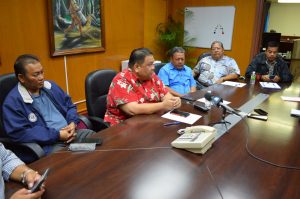Tinian leaders rally behind CW program extension

Members of the Tinian leadership state their support of the CW-1 extension during a press conference led by Tinian Mayor Joey Patrick San Nicolas. Members include Sen. Francisco Cruz (R-Tinian), far left, San Nicolas, second left, Tinian Rep. Edwin Aldan (R-Tinian), center, Sen. Francisco Borja (R-Tinian), second right, and Sen. Jude Hofschneider (R-Tinian), far right. (Erwin Encinares)
The Tinian leadership has expressed a united stance in having the CNMI-Only Transitional Worker program extended past its 2019 expiration, saying it will ensure the growth and development of Tinian and the rest of the CNMI.
Tinian Mayor Joey Patrick San Nicolas, Rep. Edwin Aldan (R-Tinian), and Sens. Jude Hofschneider (R-Tinian), Francisco Cruz (R-Tinian), and Francisco Borja (R-Tinian) voiced their support for the CW-1 program extension in the wake of the House of Representatives’ passage of a joint resolution supporting the same.
House Joint Resolution 20-07 supports Gov. Ralph DLG Torres and the CNMI private sector’s endeavors in calling for amendments to U.S. Public Law 110-229, the Consolidated Natural Resources Act of 2008, which created the CW-1 program.
Joined by Northern Marianas Business Alliance Corp. member Viola Alepuyo, the Tinian leadership read a statement on Tuesday, saying that, even at current cap levels, Tinian continues to “experience hardship in competing with big businesses on Saipan for skilled workers for our development projects.”
“It is important to note that without the CW-1 program, it’s greatly impacting [developers interested in Tinian] in moving forward,” the statement added.
Tinian leaders stressed that there are currently three developers interested in setting up businesses on Tinian: Bridge Investment Group USA, Alter City Group, and Tinian Entertainment Corp. All three are looking to set up a casino on Tinian and have already secured their licenses from the Tinian Casino Gaming Control Commission.
To put the matter in perspective, during the eight-month construction of the Tinian Dynasty Hotel & Casino, Tinian’s former largest revenue generator during the late 1990s to early 2000s, Tinian leadership members recall that roughly 1,500 workers were needed to build the hotel-casino, while 1,300 were needed for operation.
Altogether, Tinian has an estimated population of about 3,000, including the elderly, children, and residents who are unable to work.
San Nicolas pointed out that, even if all U.S.-qualified workers on Tinian were to be employed, it would still not be enough to meet the three developers’ workforce needs.
“I think we all agree that one day, we will have the capacity for local, trained, U.S.-eligible workers that will fill all the position required for there to be a viable casino or service-based industry in the Commonwealth, especially on Tinian, but we are not there yet,” he said, adding that both Tinian and Rota depend on CW-1 workers as both islands are on the “verge of development.”
“For [the CW-1 program] to expire in 2019 would really mean [both] small and big businesses will not be able to fill these positions that is required for them to continue the services they provide,” he added.
The Tinian leadership recognized that continuing the CW-1 program is the best for all of the CNMI.
In response to those who support letting the CW-1 program expire, Hofschneider said the Legislature has been always supported the Northern Marianas Trades Institute, Northern Marianas College, Public School System, and other workforce development facilities.
“…All of them are onboard right now in terms of developing the workforce that we need here—whether it be for the hospitality industry or any other industry that is able to sustain our economy here. Having done that, we still need the continuity of the program itself to build that [workforce] capacity. At this juncture right now, we are not quite there yet,” he said.
“We are a growing economy; we are barely 40 years old,” he said, adding that several local and federal policies have affected the growth of the economy within the time span. “It is unfortunate that the [CW-1 slots] have been [reduced by] 3,000,” especially at this stage of the economy when investors and developers are interested in the CNMI.
“…We continue to meet our obligations to our retirees, raise salaries of our civil servants, and pay age-old obligations that have been on the books for many years. To continue and sustain this growth and development, and to continue to meet our obligations, we need a steady supply of workers,” Aldan added.
“[Tinian has] many investors [with] serious interest in helping us build our economy but without workers, we are going to be reduced to [an] economy that relies on government funding,” he added.
Cruz (R-Tinian) believes that segregating the CW-1 slots for both Tinian and Rota must be sought as well. He cited a Tinian business that had to shut down for a month due to CW-1 complications.
As of publication, Gov. Ralph DLG Torres is currently in Washington, D.C. to seek a reprieve from the massive CW-1 cut as well as to start negotiating the fate of the CW-1 program.
Members of the NMBAC, including Alepuyo, would be heading for the nation’s capital as well in order to support Torres in his meetings.



























